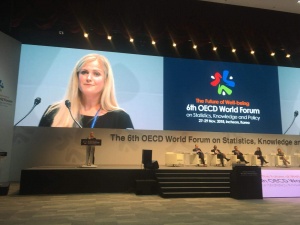By Katherine Trebeck, Wellbeing Economy Alliance
In one of the most artificial surroundings it is possible to imagine – a purpose-built conference zone near Incheon in South Korea – three thousand people gathered to explore the future of wellbeing. This was the 6th wellbeing forum hosted by the OECD’s statistics unit, a team that has been at the forefront of measuring quality of life for over a decade.
Discussions ranged from how data can help in the post-truth era to resilience and social protection. Nobel laureates, royalty, heads of international agencies joined with statisticians, civil servants, and academics to debate and learn from each other about the state of play in measurement and the implications for policy making.
And amongst it all, WEAll was making its presence felt.
Wellbeing Economy Governments
WEAll was able to join the launch of the Wellbeing Economy Governments initiative. WEGo is something the WEAll team initiated (pre-dating the official formation of WEAll) and has been supporting for some time. Seeing it ‘go live’ was an important juncture for the wellbeing economy agenda and WEAll’s role in it.
WEGo is a partnership of national and regional governments, led by Scotland and joined by the likes of New Zealand and Iceland. It will promote sharing of expertise and best practice in designing an economy in service of collective. Its participants are civil servants and ministers who recognise that ‘development’ in the 21st century is a matter of delivering human and ecological wellbeing: wellbeing for people and planet.
The stated objectives of WEGo are:
- COLLABORATE in pursuit of innovative policy approaches to create wellbeing economies – sharing what works and what doesn’t to inform policymaking for change.
- PROGRESS toward the UN Sustainable Development Goals, in line with Goal 17, fostering partnership and cooperation to identify approaches to delivering wellbeing.
- ADDRESS the pressing economic, social and environmental challenges of our time.
The primary mechanism to advance these goals is a Policy Lab through which government officials will share relevant experience and expertise. Agenda items will include: protecting the natural world, addressing child poverty, undertaking wellbeing budgeting, utilising predictive analytics, and shaping government performance frameworks. In 2019 WEGo’s first Policy Lab will take place and an inaugural gathering of Senior Officials and Ministers from member states is planned to discuss progress in creating wellbeing economies.
Gary Gillespie, the Chief Economist for the Scottish Government, whose office is the secretariat for WEGo, described it as ‘bringing the economic lens back in’ to the wellbeing agenda. Bennedikt Arnason of the Icelandic government spoke of WEGo as the ‘ideal platform to contribute, to share and promote policy making for greater wellbeing’. Professor Joseph Stiglitz described WEGo as a ‘fascinating and important initiative of these governments: putting wellbeing into practice’.
Professor Stiglitz also spoke of the importance of persisting – and this has been the story of getting WEGo to where it is now. It has been a bumpy road as political changes altered governmental priorities (and government personnel). But while WEGo is still a small, fledging project, it has potential to shift the conversation about how economies are designed, how they work, and what they deliver. WEAll will be there cheering it on and helping input to its activities.
WEAll on the main stage
The conference also provided the chance to introduce WEAll into conversations about governance and whole-of-government policy frameworks – I moderated a session on the latter and joined a roundtable on the former and also spoke at an event hosted by the University of Melbourne exploring the importance of community participation in development of beyond-GDP indices and how to bring the lessons of these indices into political decision making.

From Incheon into action
The OECD is playing an important role in upping the ante on wellbeing. In part by hosting these (massive!) global conferences every few years where the big names and rock stars of the wellbeing measurement movement join researchers and people working on translating the ideas and evidence into better government decisions. But, also by ensuring that the statistics and measurements are available, that the frameworks for thinking about operationalising the agenda are shared, and by reinforcing the importance of a broad-based understanding of wellbeing that takes account of people’s circumstances (including future generations), not simply how they report they are feeling.
This matters – the OECD is a large and influential agency. Its reports are read by governments, its assessments of respective country’s performance spurs debate, and its policy recommendations are keenly attended to. Many of the speeches and discussions at the conference wouldn’t have been unfamiliar in WEAll members’ calls. And that gives cause to hope that the momentum and drive to build a wellbeing economy is building in many quarters and (dare we hope?) heading into the mainstream.
the discussion?
Let us know what
you would like
to write about!
